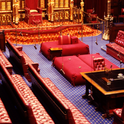Not so long ago, a reader’s letter used to appear in broadsheets almost every week complaining that politicians were too obedient. They were sheep, the letter would grumble, too invested in their own careers to stand up to the party whips or speak their minds, voting through any half-baked nonsense ministers plonked in front of them. Whatever happened to those robust MPs of years past, who followed their consciences and would challenge their governments if it was the right thing to do? Bring them back!
Nobody writes that now. These days rebellions are so commonplace as to make governing nigh-on impossible. Just one week into her new parliament, Theresa May caved in to a revolt on abortion charges, meaning Northern Irish women coming to Britain will no longer have to pay. The rebelling Conservative backbenchers, backing Labour MPs, were so formidable that Philip Hammond was forced to interrupt his own speech at the despatch box to announce the u-turn—just hours earlier, the Department of Health had denied there was even a consultation on the question.
Another Tory rebellion followed hot on its heels—this time over pensions for women born in the 1950s. The insurgents have cause to hope it will work, too—with the government having buckled over axing free school meals, and visibly wobbling on school funding and the public sector pay cap. To see off an opposition day motion on public pay, ministers had to give reassurances that could prove costly, to keep their troops in line. More of this sort of thing is on the way. Tory MPs Tom Tugendhat, who has just propelled himself into the chair of the Foreign Affairs Select Committee, and Bob Neill have warned they are ready to mutiny should a hard Brexit threaten the economy. Another backbencher, Heidi Allen, has called on the prime minister to “be compassionate,” and muttered with a vagueness that will infuriate the whips that her party “must change.”
It’s hard to bring malcontents of this sort into line. The chief government whip Gavin Williamson might keep a tarantula on his desk—“a perfect example of an incredibly clean, ruthless killer”—but he is fooling no one. A recent BBC docudrama paints Williamson as a ruthless figure: “I’ll fire you, then I’ll fucking castrate you, alright?” it has him warning one rebel. But this is all wrong, too. The days of the feared Malcolm Tucker-esque figure are over. In reality the only weapons in the whips’ armoury are persuasion and negotiation. And the more rebels there are, the more expensive it is to buy them off.
It’s not just the Tories. Jeremy Corbyn’s relatively strong election has not much tamed his MPs. While most now accept he isn’t going anywhere, there are real differences of opinion within the Parliamentary Labour Party over Brexit. A fifth of them defied him over Brexit policy—backing an amendment calling for the UK to stay in the single market, and forcing him to sack three front-benchers. Labour’s splits on this issue will become harder to hide as the negotiations in Brussels take shape.
Even the Liberal Democrats have found it difficult to keep their few MPs in line. Last year, when Tim Farron made a second referendum on European Union membership his central promise, party heavyweights Vince Cable and Paddy Ashdown told reporters that this was a terrible idea, and that the Lib Dem position was in fact quite different. Two MPs, Norman Lamb and Greg Mulholland, failed to back Farron on the crunch Article 50 Vote this year. This pair represented fully one quarter of the entire Lib Dem parliamentary party at the time—the spirit of rebellion now extending even to Parliamentary rumps.
"Governing has got scrappier. But it's hard to imagine the poll tax going through unamended today"Why this new age of the backbencher? Several contemporary thoughts spring to mind: unpopular leaders; the divisive Brexit question; the rise of Corbyn, long a backbencher so rebellious that the whips used to ring him up to check he would definitely be rebelling, rather than waste time trying to get him to abstain.
But the roots go further back. MPs first experimented with rebellion around the time teenagers did—in the later 1960s—and things grew from there. Back in the 1950s, there were two entire years where not a single Tory backbencher defied the whip, and it was only in 3 per cent of votes in each parliament where anyone did. It may not be a coincidence that this sheep-like discipline began to fracture between Britain’s first failed attempt to enter the Common Market in 1963, and the third, successful bid, which became effective a decade later, after 69 Labour MPs disobeyed Harold Wilson and got behind Edward Heath, outvoting the then-smaller band of Europhobes on the Conservative benches. Throughout the 1980s and 90s, the number of votes with rebelling MPs grew to around 12 per cent, although it took a long time for anyone to notice. That may have been because of Margaret Thatcher’s thumping majorities—the whips remained confident enough to dismiss Tory rebels like Nicholas Winterton with the words “I’m too busy to waste my time with a tosser like you.”
By the early 2000s, despite those grumbling letters to the editor, parliament was at its most mutinous in modern times: some 20 per cent of votes were defied by at least one MP. By 2010, that proportion was closer to 40 per cent. The big change, says Philip Cowley, a professor of politics at Queen Mary, University of London, is that now even fairly tribal MPs rebel. There have always been occasional temperamental loners (think of the late Labour MP Tam Dalyell), but now far more mainstream characters are prepared to turn against their leaders.
The surge in backbench confidence is linked to a rise in power, particularly on select committees. When the last parliament ended, Frank Field, Yvette Cooper, Hilary Benn and Sarah Wollaston each chaired select committees in fields in which they already had some standing, and gained extra influence as a result. The posts are now hotly contested. Six Tories were vying for the chairs of both the Treasury and Education committees.
It wasn’t always this way. Select committee membership was once a penance—some members didn’t even bother turning up—and even the chairs could be fixed by the whips. But in 2010, Tony Wright, then chair of the House of Commons Reform Committee, made them much more independent, most importantly through elected chairs. It worked. “Now, on a select committee, you are a big player,” Wright tells me. “Whips can’t stuff it with their people.” And now, free of the whips, select committees have the freedom to criticise who they like.
Committee chairs have become a real alternative to a ministerial office—you just get on television more from the start. These are arenas where backbenchers can prove themselves and show off, cross-questioning witnesses in front of a room filled with journalists. They have a chance to maul hate figures, such as businessmen Mike Ashley and Philip Green, and big personalities can emerge—as Margaret Hodge did, in denouncing maladministering bureaucrats and interrogating tax-dodging corporates at the Public Accounts Committee. Independent MPs who actually know their subject, such as Wollaston, who worked as a GP for 20 years, or Rory Stewart (Defence), who worked as a diplomat in Iraq and Afghanistan, have seized the chairs and used them to shine. Between 2008 and 2012 media interest in these committees tripled, and all the attention has achieved real influence too: around 30-40 per cent of their recommendations end up as policy.
Meanwhile, backbencher power has been steadily shored up elsewhere in the Commons. Speaker John Bercow—who wants his epitaph to be “He was the backbenchers’ champion”—is a major reason. He has speeded up question times, so more voices are heard, and paid less regard to traditional pecking orders in debates. He has revelled in granting MPs “Urgent Questions,” which see ministers summoned to the House to answer without notice. In Bercow’s first five years as Speaker he allowed three times as many as his predecessor, and when re-elected in 2015 said he hoped to grant “around one… a week.”
"These days rebellions are so commonplace as to make governing nigh-on impossible"But it’s not just the reforms, it’s the personnel too. In response to cynicism about “career politicians,” after the 2009 expenses crisis especially, parties started to select more independent and less craven MPs. This batch tend to be more invested in their constituencies, and less interested in the whips. The same fad for “off-message” politicians that speeded the rise of Boris Johnson, reduced the perceived rewards for toeing the party line.
MPs who speak their own mind can nurture a personal profile that can prove a useful resource. Labour’s strong local campaigns—against the Tories’ distinctly national one—are thought to have helped pull off some surprisingly good results in June. And technology has only encouraged the drift: a big following on Twitter has provided many backbench MPs with a far larger megaphone than their predecessors could rely on.
While in the 1970s many MPs hailed from the army, having been in the war, more nowadays are drawn from professions with increasingly sloppy hierarchies. Some are inclined to see the submissive climb to power as too boring, or too chancy. Instead, they will become lifelong rebels.
Chaos after Brexit has further discouraged members from knuckling down. MPs from recent intakes sense that everything’s up for grabs, and are clamouring to see new talent on the front bench. Younger MPs such as anti-hard Brexit Tugendhat and Johnny Mercer this year ran for committee chairs, rather than waiting their turn. It’s notable that even the military sorts—Tugendhat and Mercer both served in the armed forces—are rebelling these days. There was even a meeting to discuss a “young bloods” select committee slate.
In Labour, disgruntled MPs now see no chance of ousting the leader, so are turning to a boisterous life on the backbenches instead. They could form blocs, and they’re not the only ones. Scottish Tories, who under Ruth Davidson have just had their best election result since 1983, are about to test their new muscle. They are reportedly ready to vote together to protect Scottish interests.
Historically high levels of rebellion through the New Labour years, and indeed under the Coalition, didn’t often jeopardise the government’s ability to get its business through, because they had the numbers. Now, however, the task is different and much more difficult—to govern in a parliament where there is neither much discipline nor any majority. May, who ran the Home Office with a panicky grip of iron (and briefly attempted the same thing with the country), seems constitutionally unsuited to the mix of charm, arm-twisting, nods, winks and perhaps double dealing that is required. It is going to be a mess.
Scrappy as it may be, voters certainly approve of the new rebellion, Philip Cowley insists: they like to see a certain independence in their MPs. And the voters, he argues, are not wrong. “The more independent MPs we have, the less chance we have of poorly scrutinised legislation going through,” he says. And that is true enough: it is hard to imagine the poll tax going through unamended today. On the other hand, as Cowley concedes, ill-thought through laws are not “always the thing they rebel on.” Sometimes, rebellion is about getting behind a popular interest without stopping to worry about policy. Think of the abortive attempt to raise self-employed National Insurance in the Budget, a defensible rationalisation, but something no government will attempt again any time soon.
The end of political deference is not without its problems. But, in the end, Cowley is surely right that it improves the hope of parliament doing its most important task: “Parliament is a wonderful scrutinising machine, but is stifled by influence of party.” Rebel MPs help free it up again.
The awkward squad: Tories who could cause May problems
Heidi Allen
The South Cambridge MP (below centre) is one of the government’s most outspoken critics—she even slated the party in her maiden speech. Her focus is welfare cuts, but she also recently tore into Theresa May’s deal with the DUP after the election result, saying: “I can barely put into words my anger.” She may irritate the whips—but in practice rarely defies them when it comes to voting.
Ruth Davidson
The leader of the Scottish Tories had a very good election, and flexed her new muscles by asking May to guarantee her DUP deal would not affect gay rights. There are now reports her group of 13 Scottish MPs will vote as a bloc in their national interest. Despite not holding a Westminster seat, Davidson may be the biggest threat to the prime minister.
Nicky Morgan
A once tribal Tory MP gone rogue. Very rogue. Before the election she caused major annoyance to the leader’s office with remarks about May’s leather trousers; now she’s now chair of the Treasury Select Committee—the first woman to hold the post. Could she be a serious iceberg for May in the coming months?
Robert Halfon
A close ally of trainee journalist (and former chancellor) George Osborne, Halfon (below right) was surprisingly sacked after the election. The man who once argued the Tories should rename themselves the Workers’ Party believes his party is “on death row” and needs to fundamentally reform, with a moral message at the centre. Perhaps he will be able to have a greater impact as chair of the Education Select Committee.
Sarah Wollaston
The new chair of the Health Select Committee (below left) has never been tribal and has always been slightly at odds with the culture of her party. She is experienced and hugely respected— and likely to cause lots of trouble as the government squeezes NHS services and tries to hammer out post-Brexit deals on big pharma.












